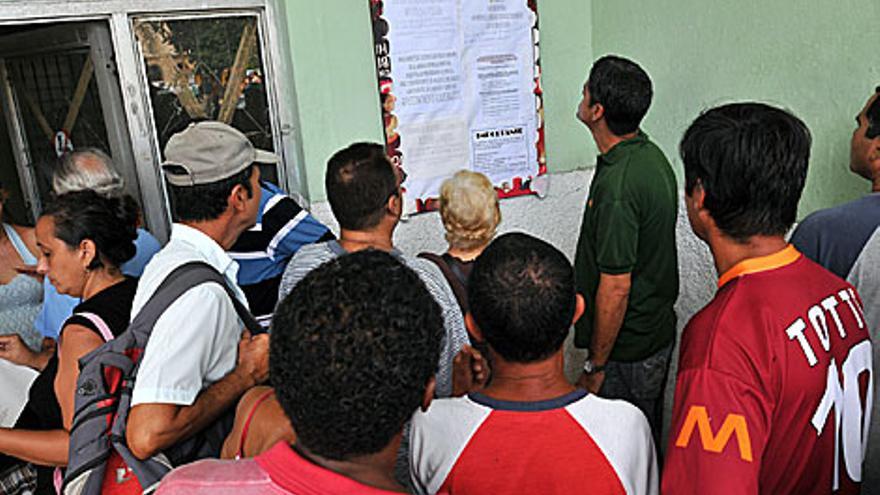
![]() 14ymedio, Havana, 18 June 2021 — Some 53% of the people of Sancti Spíritus who go to an employment office reject the offer of work, as revealed by the provincial authorities, who have not explained the arguments offered by more than half the population for not wanting the job proposed to them. Of the more than 8,200 people who came looking for pincha (work), the majority of those who accepted it were women under 35 years of age.
14ymedio, Havana, 18 June 2021 — Some 53% of the people of Sancti Spíritus who go to an employment office reject the offer of work, as revealed by the provincial authorities, who have not explained the arguments offered by more than half the population for not wanting the job proposed to them. Of the more than 8,200 people who came looking for pincha (work), the majority of those who accepted it were women under 35 years of age.
Teresita Romero Rodríguez, governor of the province, provided these data in a meeting this Thursday in Sancti Spíritus in which the ’Ordering Task’* was evaluated. The data revealed that 24 state companies closed in the first quarter, with losses, and it is expected that at least five of them will end the year badly.
The authorities expect the others to recover, although the evolution of the pandemic and the absence of changes in the US embargo do not exactly invite optimism.
Romero, who insisted on the importance of protecting the vulnerable, asked the population to work to take advantage of the 63 measures approved for the agricultural sector. The key measure of this economic package was the liberalization of the sale of surplus beef and milk for those producers who had contributed the mandatory quota to the State. However, in the province only 1% of those who raise cattle meet the conditions.
The local newspaper Escambray indicated that “more than 80 farmers, private or state” could market their products and the number could grow “discreetly.” In Sancti Spíritus there are 2,900 landless farmers who graze animals, precisely one of the requirements to be authorized to dispose of their own livestock.
The governor pointed out one of the few things that is going smoothly: fines. According to Romero, around “7,000 control-of-retail-price actions have been imposed and 1,197 fines have been applied,” at all kinds of points of sale, from state markets to the self-employed, and including foreign currency stores.
These types of economic sanctions are also complemented by administrative ones, such as the withdrawal of licenses, confiscation of products, forced sale and, when necessary, a criminal complaint. Romero stressed the importance of being rigorous with control and punitive measures.
Barely a day had passed since the press reported on the dismantling of a network of “60 home warehouses” dedicated to “illicit economic activity” with more than 1,050 complaints made, especially in the capital and the municipalities of Trinidad, Cabaiguán and Jatibonico.
In addition, the police dismantled 19 illegal factories producing all kinds of products. Hundreds of thousands of pounds of food, 36,462 boxes of cigarettes and 7,828 toiletries were seized in this operation.
The data for the first quarter have been bad not only in Sancti Spíritus. A few days ago it was learned that local companies in Ciego de Ávila lost more than 53 million pesos until April.
Some of the most catastrophic figures in food were in the fall in the trade of pork and sausages, which only reached 22.3% of the forecasts, and eggs, which reached just 16.7%. The commercial sector lost 28 million pesos and food services 24 million pesos.
In this province the alarms had already gone off when the Ceballos Agroindustrial Company, a former jewel in the State’s crown and the main industry in the territory, closed January with red numbers.
*Translator’s note: The ‘Ordering Task’ [Tarea ordenamiento] which is a collection of measures that includes eliminating the Cuban Convertible Peso (CUC), leaving the Cuban peso as the only national currency, raising prices, raising salaries (but not as much as prices), opening stores that take payment only in hard currency which must be in the form of specially issued pre-paid debit cards, and others.
____________
COLLABORATE WITH OUR WORK: The 14ymedio team is committed to practicing serious journalism that reflects Cuba’s reality in all its depth. Thank you for joining us on this long journey. We invite you to continue supporting us by becoming a member of 14ymedio now. Together we can continue transforming journalism in Cuba.
